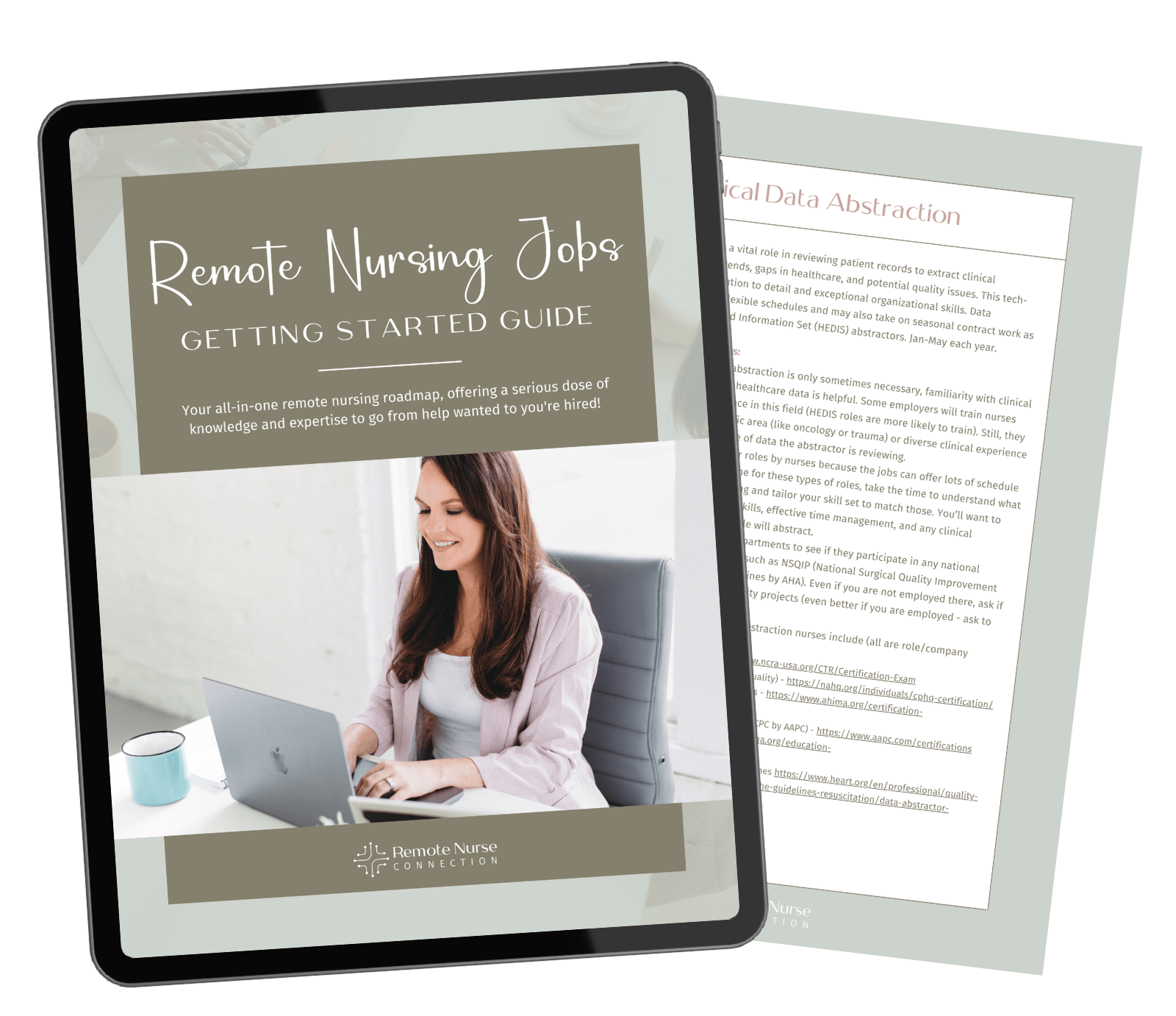
Does the idea of working remotely make you worry that you’ll lose the patient connection you love in nursing? You’re not alone. Many nurses hesitate to pursue remote nursing jobs, thinking they’ll be tied to a computer all day. However, roles like clinical nurse educator at pharmaceutical or biotech companies offer a blend of patient interaction and computer work. These positions let you continue making an impact on patient care while enjoying the benefits of working from home.
I had the pleasure of interviewing a nurse who transitioned from bedside nursing to a clinical nurse educator role at a pharmaceutical company. She shared her journey, the responsibilities of her job, and the challenges of transitioning to a remote role. Read on to learn more about this unique nursing opportunity.
What is a Pharmaceutical Nurse Educator?
A remote clinical nurse educator plays a key role in patient education at biotech and pharmaceutical companies. These nurses focus on helping patients manage their treatment plans, understand medications, and use medical devices. While the role differs from traditional bedside nursing, it allows nurses to leverage their clinical and education skills in new ways while still keeping patient care and advocacy at the forefront of their career.
How to Become A Clinical Nurse Educator at a Pharmaceutical Company
When I asked her about her journey, she shared her experience as a registered nurse since 2014. She began her career in Stepdown ICU before transitioning to an agency float pool. She really enjoyed this position because it offered her the flexibility of making her own schedule that didn’t include weekends and holidays. But in 2020 her agency shifts became scarce, and she found herself searching for a new nursing job.
She shared that working in a pharmaceutical company wasn’t something she initially considered, but the remote clinical nurse educator position felt like a good fit when she came across it. “I applied, went through a couple of interviews, and got the job pretty quickly! I made sure to highlight my experience with patient education—whether it was teaching wound care or self-injections. It really helped in landing the role,” she explained.
A Day in the Life of a Remote Clinical Nurse Educator
In her nurse educator role, she connects with patients who are starting specialty medications. Some patients enroll through the company savings programs, while others are referred by their specialty pharmacy or doctor. Much of her day involves outbound and inbound phone calls, and the job requires strong communication and motivational interviewing skills to keep patients engaged.
She mentioned that, at times, part of the job could feel a little “salesy,” as there’s pressure to convince patients to participate in virtual education calls. These virtual sessions might involve teaching patients how to administer injections or discussing their treatment plans. The company tracks the nurse’s engagement rates and completion of virtual calls (referred to as KPIs or key performance indicators), which are tied to performance bonuses.
Despite these demands, she finds the role very rewarding. She shared that “when you assist a patient with starting a medication that finally works & they call you to tell you that their quality of life is back to where it was prior to being diagnosed with their disease- this makes it all worth it. There will always be patients who are so grateful for all that you do to help them! These are the patients that make you feel good about what you do.”
She appreciates the autonomy her role offers, especially being able to manage her own schedule. She opted to use her break times to drop off and pick up her daughter from school but adds that “the work still has to be done,” so you’ll play catch up later for any work time missed. However, she’s never entirely on her own, as the team frequently checks in with each other to ensure they stay aligned, and managers “are pretty supportive and will step in to help with certain tasks in order to lighten your load for the day.”
Although managing the workload can be challenging at times, she has developed strategies to stay organized. She explained that prioritization is key, knowing what tasks are urgent and what can be done later. Tools like planners and digital resources have become invaluable in keeping her on track and helping her navigate the demands of a busy day.
Nurses Impact on Patient Care
Even in a remote capacity, the connection with patients remains strong. “For patients who are new to self-injections or specialty medications, we offer the guidance they need to feel more confident. I might spend half my morning walking patients through how to use a device or going over potential side effects.”
Building trust is an essential part of her role. “At first, some patients can be hesitant, especially with virtual care. But after a few calls, they start to open up and trust you more. Building that rapport is one of the most rewarding parts of my job.”
The support provided by a clinical nurse educator can be invaluable, especially for patients unfamiliar with their treatment. This role proves that you can still make a significant difference in patients’ lives without physically being in the hospital.
“Those patients will thank you over and over again. And they’ll remind you that you can still make a difference in people’s lives without stepping foot in a hospital again.”
Challenges and Growth Opportunities
The role isn’t without its hurdles. “Keeping track of metrics, participating in team meetings, and staying on top of a heavy caseload can be tough,” she admits. “It’s very different from the fast-paced environment of the hospital, but once you get into the flow, it becomes manageable if your caseload doesn’t get too high.”
She goes on to say that setting boundaries is necessary at times so that you aren’t overwhelming yourself with additional committee work that management may be encouraging you to take on. However, those extra projects are great opportunities for career advancement and professional growth, so it’s something to take into consideration if it aligns with your future goals (they’ll give your resume a boost!).
Advice for Transitioning Nurses
For those considering a shift from bedside to a remote clinical nurse educator, she offers a few key pieces of advice. “Focus on your patient education experience and technical skills in your resume. In this job, strong communication is essential, and being comfortable with virtual tools is a big plus.”
When asked about any special certifications, she noted, “I didn’t take any specific courses before applying, but I think it’s important to highlight your skills that align with what the company is looking for. If you have experience in teaching or patient care education, emphasize that.” She again acknowledges these jobs are more competitive now than when she was applying in 2020, so it might not be as quick of a hiring process that she lucked out with.
Salary and Benefits at Her Company
When considering a clinical nurse educator role at pharmaceutical and biotech companies, salary expectations are important to research. She reports the starting salary at her company is firm, within the range of $76,000 to $79,000, and that the pay is the same regardless of where you live in the U.S. This means there’s no extra compensation offered for living in more expensive cities—it’s a “take it or leave it.”
In addition to the base salary, she mentioned there are opportunities to earn two annual bonuses, each ranging from $5,000 to $6,000 before taxes. However, these bonuses are performance-based, meaning you’ll only receive them if you meet specific key performance indicators (KPIs).
As for travel, her team was expected to attend at least one national meeting each year, typically held in February for four days. Additional regional or district meetings may pop up throughout the year, which usually last three days. While all expenses (meals, flights, accommodations) are covered for these trips, it’s important to note that family members are not allowed to accompany you, and the meetings are strictly business with little free time.
For additional salary market research for these roles at various companies and locations, I recommend using Glassdoor’s Salary tool.
Final Thoughts
If you’re a nurse looking to combine your passion for patient care with the flexibility of remote work, a clinical nurse educator role in the biotech or pharmaceutical industry could be a great fit. It offers the best of both worlds: patient interaction and the ability to work from home. Though the job has its challenges, such as managing a high caseload and meeting performance metrics, the satisfaction of helping patients navigate their treatment plans makes it worthwhile.
For more information about other pharmaceutical and biotech nursing roles, check out my other blog posts: Which Companies Hire Nurses for Biotech Jobs? and Types of Biotech Nursing Jobs Explained.
Remote Nurse Connection is proudly Ad-free. All opinions are my own. This post may contain affiliate links, which means I’ll receive a commission if you purchase through my link, at no extra cost to you. As an Amazon Associate, I earn from qualifying purchases. Please read full disclosure here.
Browse A Bit More On the Blog…
Hurricane Helene: How Nurses Can Help North Carolina
Oct 4, 2024
I've been receiving so many messages from you all asking how you can help in North Carolina with Hurricane Helene relief efforts—thank you for your kindness and willingness to support those affected. As someone who grew up in Western North Carolina, where my family...
Personal Finance for Nurses: 10 Tips from a Nurse-Turned-Entrepreneur
Sep 26, 2024
Has money ever kept you from achieving your goals? Have you ever felt stuck because your personal finances are out of control? You aren’t alone. On my professional journey, I have met many nurses who felt as if they were slaves to their money. Some of the most...

Your Insider Connection to Remote Nursing Success
I help nurses find the best-fit remote jobs that bring flexibility, personal freedom and alignment, and continued professional growth.
CATEGORIES

Free Getting Started Guide
FOR LANDING A
REMOTE NURSING POSITION!


